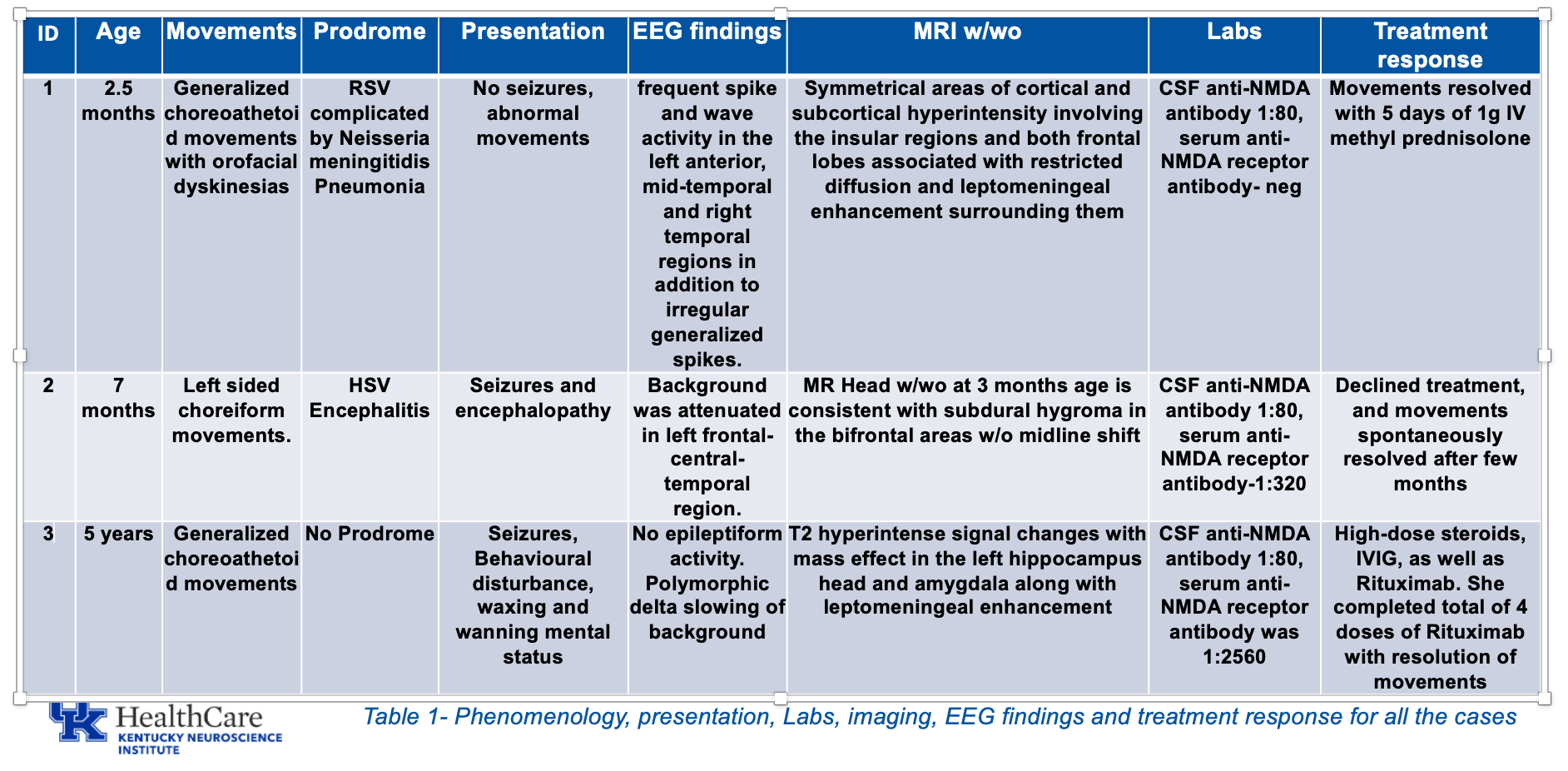Category: Pediatric Movement Disorders
Objective: The intention of this case series is to raise awareness about movement disorders in Pediatric NMDA encephalitis, a potentially reversible cause of a common medical emergency.
Background: Anti-N-Methyl-D-Aspartate (NMDA) Receptor antibody is the second most common immune mediated encephalitis, after acute disseminated encephalomyelitis in pediatric population. In 70% of patients, the clinical course is preceded by a non-specific prodrome of fever, headache, nausea, or upper respiratory symptoms. Common clinical presentation includes prominent psychiatric symptoms, cognitive impairment, seizures, autonomic instability, and movement disorders (MD). MDs are seen in 90% of cases and three principal MDs are chorea, stereotypies, and dystonia.
Method: A detailed workup including history, pertinent labs, EEG, imaging were obtained on children who presented with abnormal movements to Pediatric neurology service at University of Kentucky and were subsequently diagnosed with Anti-NMDA-receptor antibody encephalitis
Results: Between 2016 and 2021, we had three pediatric cases that presented with abnormal choreo-athetoid movements who were subsequently diagnosed with Anti-NMDA-receptor antibody encephalitis. Two of the three cases were infants (2.5 months and 7.5 months) and one of them was a 5-year-old child. One of the cases had a preceding infection with Herpes simplex virus encephalitis, while the other case had a Respiratory syncytial virus bronchiolitis complicated by Neisseria meningitides pneumonia. EEG captured movements in all three cases with no epileptiform correlate. Two of the three cases had elevated serum Anti- NMDA antibody titers and one of them had only CSF antibody positivity. Treatment options included high dose IV methyl prednisolone with good response, followed by Rituximab infusions in resistant cases.
Conclusion: Clinicians should have high suspicion for Anti-NMDA-receptor antibody encephalitis in children presenting with abnormal movements and a preceding history of an infectious prodrome. NMDAR antibody-testing is more sensitive in CSF than serum. Aggressive testing in both serum and CSF is warranted when EEG is not consistent with seizures, because Anti-NMDA-receptor antibody encephalitis is a treatable neurological condition with high morbidity and mortality if left untreated.
References: Armangue, T., Leypoldt, F., Málaga, I., Raspall-Chaure, M., Marti, I., Nichter, C., Pugh, J., Vicente-Rasoamalala, M., Lafuente-Hidalgo, M., Macaya, A., Ke, M., Titulaer, M. J., Höftberger, R., Sheriff, H., Glaser, C., & Dalmau, J. (2014). Herpes simplex virus encephalitis is a trigger of brain autoimmunity. Annals of neurology, 75(2), 317–323. https://doi.org/10.1002/ana.24083
Matoq, A. A., Rappoport, A. S., Yang, Y., O’Babatunde, J., Bakerywala, R., & Sheth, R. D. (2015). Anti-NMDA-receptor antibody encephalitis in infants. Epilepsy & behavior case reports, 4, 99–101. https://doi.org/10.1016/j.ebcr.2015.07.005
One of the cases has been submitted to video case challenge at MDS PAS 2022 in Miami.
One of the other cases has been presented as poster at AAN 2020. Infant presenting with Autoimmune NMDA Positive encephalitis secondary to Herpes Simplex Encephalitis: A Case Report (1103)
To cite this abstract in AMA style:
RP. Vasireddy, ZG. Guduru, QK. Khan. A Case Series of children with Choreo-athetoid movements diagnosed with Anti-N-Methyl-D-Aspartate Receptor Encephalitis [abstract]. Mov Disord. 2022; 37 (suppl 2). https://www.mdsabstracts.org/abstract/a-case-series-of-children-with-choreo-athetoid-movements-diagnosed-with-anti-n-methyl-d-aspartate-receptor-encephalitis/. Accessed July 5, 2025.« Back to 2022 International Congress
MDS Abstracts - https://www.mdsabstracts.org/abstract/a-case-series-of-children-with-choreo-athetoid-movements-diagnosed-with-anti-n-methyl-d-aspartate-receptor-encephalitis/



